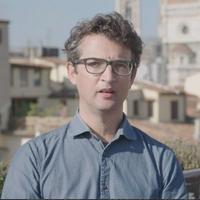Making the Renaissance Public:
Location based interpretation of early modern urban space
Digital Humanities and Sensory Heritage (DHSH) - Seminar Series
Tuesday 7 November 2023, 4.30pm
Speaker: Fabrizio Nevola (University of Exeter)
All Welcome
Joint session with the Early Modern Italian World Seminar We increasingly order the world around us in geo-spatial terms, empowered by mobile devices and geo-location, toggling between 2D maps to 3D street views. The potential of these same technologies for historical research on cities is only starting to be realized. At the same time Augmented Reality (AR) invites a new approach to the 'museum without walls', reuniting cultural heritage - cities, buildings, artworks - across time and space.
Drawing from two research projects, Hidden Cities and Florence4D this paper considers how digital art history methods are creating new research opportunities, while at the same opening up new ways to engage the wider public. Spatially-determined research questions encourage us to think about how meaning is constructed from the triad of spaces-objects-people, while spatial technologies (GIS, GPS, 3D modelling) allow us to shape innovative responses to those questions, ranging from interactive map interfaces to locative interpretation delivered on handheld devices. In so doing we’re discovering new things about the material culture of public space in the Renaissance, but also making that research directly available to the public.
Biography:

Fabrizio Nevola is Professor of Art History and Visual Culture at the University of Exeter (UK). In 2022 he was Visiting Professor at Venice International University and subsequently at the Centre for Digital and Public History at Ca’ Foscari, Università di Venezia. His research focuses on urban and architectural history of early modern cities, with a particular attention for public spaces in Italy on which he has written and published extensively. His most recent book, Street Life in Renaissance Italy (Yale UP, 2020) accompanies several edited collections involving comparative work on urban space. His first book, Siena: Constructing the Renaissance City (Yale UP, 2007) was awarded the Royal Institute of British Architects, Sir Nikolaus Pevsner International Book Award for Architecture. Through several grant-funded research projects, including the ‘Hidden Cities’ apps and the new Florence4D website, he has developed digital humanities spatial approaches using geospatial, 3D modelling and GPS technologies.
Find out more about the Digital Humanities and Sensory Heritage Network here.